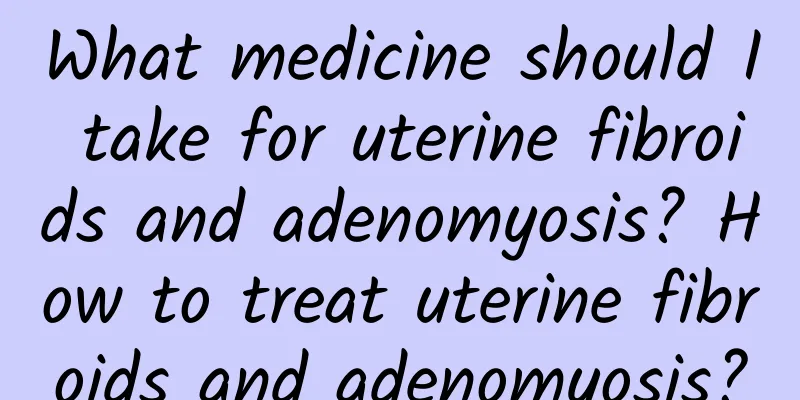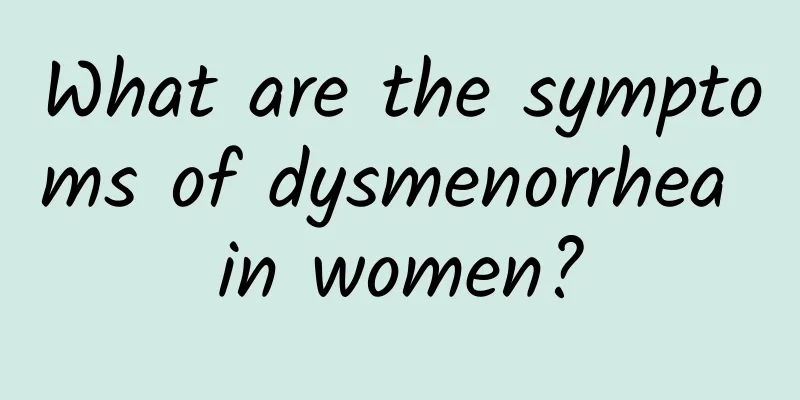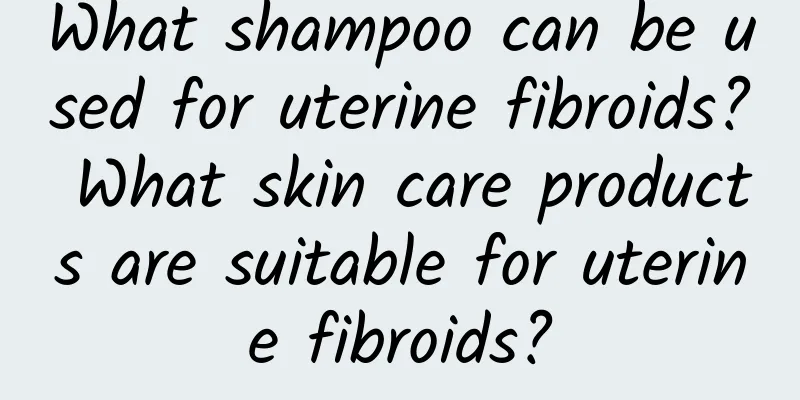What medicine should I take for uterine fibroids and adenomyosis? How to treat uterine fibroids and adenomyosis?

|
What medicine should I take for uterine fibroids and adenomyosis? How to treat uterine fibroids and adenomyosis? Introduction: Uterine fibroids and adenomyosis are common gynecological diseases that bring certain troubles to patients' lives. After learning that they have these two diseases, many patients are eager to know what medicine they should take for treatment. Although drug treatment cannot completely cure these diseases, it can relieve symptoms and delay the development of the disease. 1. Drugs for the treatment of uterine fibroids Uterine fibroids refer to benign tumors located in the myometrium of the uterus, which cause discomfort such as irregular menstruation, abdominal pain and infertility. During the treatment process, the doctor will choose the appropriate medicine for treatment according to the specific situation of the patient. 1. Contraceptive pills Contraceptive pills are one of the commonly used drugs for treating uterine fibroids. This drug can reduce the growth of uterine fibroids by inhibiting the secretion of estrogen. The use of contraceptive pills needs to be carried out under the guidance of a doctor, and attention should be paid to the side effects of the drug. 2. Progesterone drugs Progesterone drugs can reduce the symptoms of uterine fibroids by inhibiting the proliferation of the endometrium. This drug is generally used for patients with heavy menstrual bleeding and significant pain. 3. Chinese medicine conditioning Traditional Chinese medicine conditioning also has a certain effect in the treatment of uterine fibroids. Traditional Chinese medicine has the effects of warming and tonifying, activating blood circulation, etc., which can improve blood circulation and alleviate the symptoms of uterine fibroids. Patients can choose the traditional Chinese medicine suitable for them according to their own conditions. 2. Drugs for the treatment of adenomyosis Adenomyosis refers to endometriosis, which usually manifests as menstrual cramps, heavy menstrual bleeding, etc. The treatment of adenomyosis mainly involves medication to improve the patient's symptoms. 1. Nonsteroidal anti-inflammatory drugs Nonsteroidal anti-inflammatory drugs are one of the commonly used drugs for the treatment of adenomyosis. This drug can relieve the patient's symptoms by inhibiting the inflammatory response. 2. Contraceptive pills Birth control pills can also be used to treat adenomyosis. These drugs can reduce the effects of endometriosis by suppressing ovarian function, relieving symptoms such as painful and heavy periods. 3. Ovulation-stimulating drugs In some patients who cannot be treated with conventional medications, doctors may consider using ovulation-stimulating drugs to regulate the patient's menstrual cycle and relieve symptoms. Uterine fibroids and adenomyosis are common gynecological diseases. Some drugs can be used to relieve the patient's symptoms during treatment. However, it should be noted that these drugs cannot cure the disease, but can only provide temporary relief. When using drugs, patients should follow the doctor's instructions and pay attention to the side effects of the drugs. Drug treatment is only one way of treatment. Patients should also combine other treatment methods, such as surgery or other auxiliary therapies, to comprehensively treat the disease and improve the treatment effect. |
>>: What is the biggest cause of uterine fibroids? What are the signs of uterine fibroids?
Recommend
I took Kuntai capsules for half a year for premature ovarian failure
Taking Kuntai Capsules for half a year for premat...
What Chinese medicine is good for women with amenorrhea?
Chinese medicine conditioning is an effective met...
How to regulate irregular menstruation
How to regulate irregular menstruation? For women...
What can I eat to make my uterine fibroids grow slower? What can I eat to make my uterine fibroids grow smaller?
Uterine fibroids are common female reproductive s...
How much does a gynecological examination cost in Hangzhou?
How much does a gynecological examination cost in...
What are the treatments for ovarian cysts?
Ovarian cysts are a common gynecological disease,...
Put BMI and body fat aside! Do the "Nine-square Grid Exercise" to lose weight!
Where a person is more likely to gain weight or l...
Dietary considerations for women after abortion
After an abortion, women are physically weaker an...
What can I do if I have cervical erosion? Can it be cured? Do you know what cervical erosion is?
What should I do if I have cervical erosion? Gyne...
What is cervical erosion? Will cervical erosion affect pregnancy?
Cervical erosion is a very common gynecological d...
Can I still get vaccinated when I am four months pregnant? What are the dangers?
It is also possible to have an abortion in the fo...
How to cure congenital cervical erosion? 3 treatment methods for congenital cervical erosion
Congenital cervical erosion is a problem that man...
90% of Chinese people don’t get enough dietary fiber ~ 3 dietary principles can help you reach the target quickly!
The Chinese people do not consume enough dietary ...
How to do uterine fibroid surgery better? What is the most suitable time for surgery for uterine fibroids?
Uterine fibroids have a high incidence rate in wo...
What are the factors that induce chronic adnexitis in women?
What are the factors that induce chronic adnexiti...


![[Quick Questions and Answers] Can nutritional supplements really protect your eyesight?](/upload/images/67dd5dc363467.webp)






